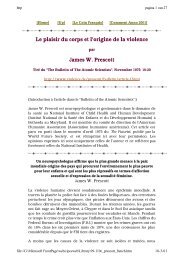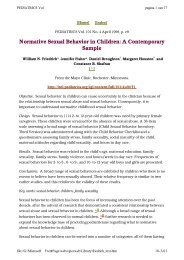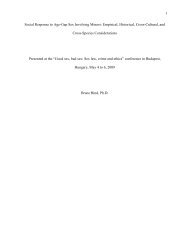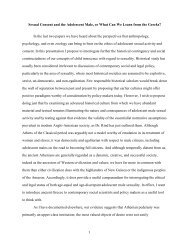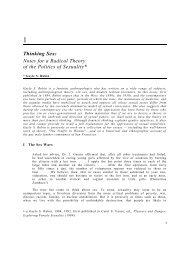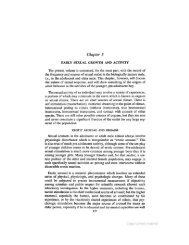Infant and Child Sexuality: A Sociological Perspective - Ipce
Infant and Child Sexuality: A Sociological Perspective - Ipce
Infant and Child Sexuality: A Sociological Perspective - Ipce
Create successful ePaper yourself
Turn your PDF publications into a flip-book with our unique Google optimized e-Paper software.
ambled over her small body. This presented a<br />
problem I had not thought of <strong>and</strong> I sickened...<br />
The best account that I know of in the literature on the ambivalent<br />
attitudes of a child toward molestation by an adult is in an account<br />
by Maya Angelou (1970, p. 94-98). She provides a graphic <strong>and</strong><br />
moving account of a child’s response to the tenderness, as well as to<br />
the violence, that can accompany intimate, sexual encounters with an<br />
adult. In good faith she cooperates <strong>and</strong> receives certain satisfactions<br />
only later to be deeply hurt by rape, extreme feelings of guilt, <strong>and</strong><br />
the threat of violence by the molester should she tell of the experience<br />
to anyone. The events that follow an occasion of child molestation<br />
can be as traumatic or more traumatic for both parties than the<br />
precipitating event itself. Intimacy is a normal part of the maturational<br />
process of children, <strong>and</strong> even child molestation, if no violent<br />
aggression or physical harm accompanies the activity, need not create<br />
sexual trauma for the child. Distress, anger, <strong>and</strong> anxiety of parents, a<br />
police investigation, <strong>and</strong> a court trial may have more traumatic effect<br />
on the child than the sexual experience itself. The aggressor in such a<br />
child-adult encounter is generally assumed to be the adult. The reader<br />
is again referred to Angelou’s perceptive account of a raped child as<br />
seen through the eyes of an offended child.<br />
A major difference between the child <strong>and</strong> the adult in a child-adult<br />
intimate encounter is that the adult is likely aware that there are<br />
statues which severely threaten his freedom if he is caught. The written<br />
codes <strong>and</strong> the prescriptions of the common law are not influential<br />
in controlling the child’s sexual behavior. His childhood experiences<br />
are behind him before he has any comprehension of the nature of the legal<br />
proscriptions of adult sex codes. (Kinsey, 1948, p. 447).<br />
Results of Sexual Encounters In Early <strong>Child</strong>hood<br />
More <strong>and</strong> more authorities on child development are accepting intimate<br />
<strong>and</strong> even sexual encounters as a normal part of the maturational<br />
process. (Katzman, 1972). <strong>Child</strong> sexuality is being seen in a broad context.<br />
No longer do we feel that early discovery of genital differences,<br />
child-child sex play, or even a single occurrence of sexual<br />
molestation will have lasting ill effects on a child involved in a stable<br />
pattern of ongoing family <strong>and</strong> community experiences. Healthy children<br />
are not as easily upset by sexual experiences as some theorists<br />
would have us believe. Feeling the genitals of another child, getting a<br />
glimpse of the parent undressed, or a look at a “girly” magazine does<br />
not seriously disturb the average child. (Finch, 1969). The child that<br />
is traumatized by the sight of a nude body, or by learning that intercourse<br />
occurs, or by learning that babies grow inside of the mother has<br />
previously developed a background of experience such that sooner or<br />
later, in one context or another, he would have been unable to cope<br />
with sexual stimuli. (Gagnon, 1965).<br />
There is no one universal reaction to the discovery of genital differences<br />
of the sexes, for instance. There exists varying degrees of<br />
acceptance, <strong>and</strong> the emotional tone accompanying the discovery is frequently<br />
one of serenity. (Conn, 1940). <strong>Child</strong>ren generally accept the<br />
differences between the sexes with composure though some have a feeling<br />
of strangeness, surprise, curiosity, disappointment, or humor.<br />
69



